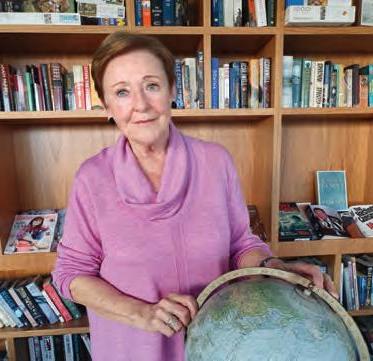
4 minute read
ON TRACK
Law has remedies for the financial abuse of elders
Elder abuse is a scourge in our society and it’s often brought on by “inheritance impatience”, writes DON MACPHERSON.
Advertisement
Sadly, the abuse of our elders usually rather than as tenants in common. comes from a child or grandchild, Properties purchased as joint who prevails upon them to provide tenants (as is the common practice with them a benefit. This has the effect of married couples) upon the death of one diminishing the resources of the elderly of the co-owners automatically go to person often at a time when they can the survivor. The transfer occurs least afford it. regardless of any statement in a will,
The abuse can be direct, such as effectively passing outside the will. simply taking money from an account to When the joint tenants are a parent which the younger person has been and child, the likelihood is that the child given access to assist the elderly person. will survive the parent, and thereby
Often the bank accounts are cleaned inherit the whole property. out, or slowly whittled away, by the Where there are other children, that trusted child or relative. arrangement can have the effect of
It can be subtle and indirect, such as benefiting the joint tenant child manoeuvring the elder into financial disproportionately in comparison with transactions that are unsuitable for the the other children. elder, but which are of great benefit to There are remedies available the younger person. This might be loans through the law to protect against elder on little or no interest to assist with abuse, and in many cases to undo purchasing a property or investments in transactions that have been entered the younger person’s business, with into inappropriately, but these matters limited prospects of repayment. are complex, and time is always of the
One example we have recently come essence. across in the latter category was a child arranging for a parent to purchase a Visit sunshinecoastelderlaw.com.au property in joint names, as joint tenants, or call 1800 961 622.
Emerging world confronts change
The Covid-19 pandemic and its lingering after-effects appears certain to fundamentally change how we work, consume, travel, interact and socialise. JUSTIN SCATTINI predicts deep and far-reaching implications for a range of sectors and industries.
In order to develop a sense of how consumers’ lives changed through the depths of the lockdown and in its immediate aftermath, and what they perceive lies in the future, we commissioned a survey of more than 500 Australians.
Survey participants represented the country’s demographic distribution across age, gender and employment status.
The vagaries of Covid-19 have led us to consider a tactical rather than longterm strategic footing for the moment.
The results of the survey have drawn elements of that positioning into question, such as should we re-think the relative depth of our consumer discretionary exposure versus consumer staples?
Furthermore, should we increase our exposure to the likes of Viva Energy Group and Ampol, for which the survey results were positive?
Nearly 50 per cent of respondents expected to fly less, both domestically and internationally, after restrictions ease, and 68 per cent will not fly internationally without a vaccine.
A driving holiday or staying at home were preferred to flying domestically or internationally for the next vacation.
We see these results as negative for air travel and supportive of our Lighten rating on Sydney Airport, and a positive for driving holidays, which is supportive of Ampol, Super Retail Group and Viva Energy Group.
Somewhat surprisingly, only a small number of people expected to visit shopping centres less, with the average visitation also expected to fall only slightly. We view this as positive for retail landlords, as we had expected a more dramatic shift given how they are priced. Our preferred retail-exposed REIT is GPT Group.
There was almost a 50 per cent increase in the number of people expecting to work from home (WFH) at least one day and the average number of WFH days a week was expected to increase from 0.9 to 1.3.
This is negative for office landlords, although it needs to be balanced against the likely need for increased space per worker to adhere to social distancing requirements.
Consumers are expected to shop online for food more post COVID-19, yet surprisingly intend to also eat out more frequently.
We had expected a result showing food retail gaining share from cafes and restaurants. This feedback has mixed implications for Coles and Metcash.
Despite already enjoying a WFH boost, consumers intend to spend more on technology (45 per cent), and gardening and hardware (33 per cent), which is supportive of Officeworks and Bunnings (Wesfarmers), JB Hi-Fi and Harvey Norman.
It will be interesting to see how consumers respond top the new normal over the coming months and possibly, years. It will certainly impact all of our investment decisions in the medium term. Justin Scattini is a senior financial adviser at Ord Minnett Buderim. Visit ords.com.au/contact/buderim
Practical Common Sense Legal Advice for you and your loved ones

Premier Legal Advisors for: • Estate Management • Retirement Village Contracts • Wills • Protection from Elder Abuse • Estate Disputes • Elder Law











